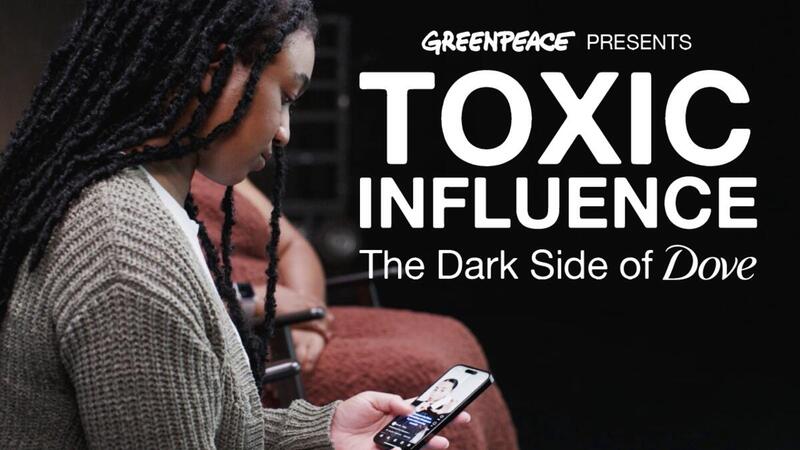Greenpeace UK has released a powerful new film today, taking direct aim at beauty giant Dove for its role in plastic pollution. The film, directed by BAFTA-nominated filmmaker Alice Russell, delivers a scathing critique of Dove’s environmental impact, accusing the brand and its parent company, Unilever, of hypocrisy. Despite Dove’s carefully crafted image as a brand with a social and environmental conscience, the film reveals the stark contrast between its marketing and its plastic footprint.
The hard-hitting short film subverts Dove’s widely praised 2022 “Toxic Influence” campaign, produced by Ogilvy, which focused on empowering young women by promoting body positivity. In Greenpeace’s version, pairs of mothers and daughters initially express admiration for Dove’s messaging. But as the film progresses, the true extent of the company’s plastic waste is revealed, leaving the women visibly shocked and disillusioned. The film, produced by Anna Wells and shot by Sarah Cunningham, lays bare the reality behind the brand’s plastic pollution, specifically focusing on single-use plastic sachets.

Greenpeace released the film just one week after activists blocked entrances to Unilever’s London headquarters. On September 5, protestors locked themselves to barricades shaped like giant Dove products, and unfurled a banner across the building’s facade reading, “Real Beauty isn’t this toxic.” The direct action marked another step in Greenpeace’s ongoing campaign to pressure Dove into addressing its plastic waste.
This latest move coincides with the 20th anniversary of Dove’s iconic “Real Beauty” campaign, which launched in 2004 and positioned the brand as a champion of social issues. However, Dove and Unilever remain among the world’s largest contributors to plastic pollution. According to a 2022 Greenpeace International report, Unilever sells the equivalent of 1,700 plastic sachets every second, with Dove responsible for producing over 6.4 billion sachets last year alone.
Greenpeace’s investigation revealed troubling evidence of Dove’s plastic waste polluting beaches and waterways in countries like the Philippines and Indonesia. Plastic sachets, a key part of Unilever’s packaging, are nearly impossible to recycle and often end up clogging local waste systems, exacerbating flooding and environmental damage. A senior Unilever executive even described the sachets as “evil” due to their inability to be recycled.
Greenpeace is now calling on Dove to phase out single-use plastics entirely, starting with sachets, and to transition to reusable packaging within the next decade. They also urge Unilever to take a strong stance at the upcoming UN Global Plastics Treaty negotiations in November, where the company will co-chair the Business Coalition.
Anna Diski, a campaigner at Greenpeace UK, emphasized the significance of the new film. “This powerful film reveals the hypocrisy at the heart of Dove’s marketing. The women and girls they claim to champion won’t accept this double standard. There’s no ‘Real Beauty’ in the harm Dove’s plastic pollution causes to the environment.”
As Greenpeace continues to escalate its campaign, it remains to be seen how Dove and Unilever will respond to growing calls for meaningful action on plastic pollution.
